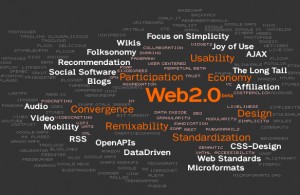 Don has a thought-provoking post on the use of Facebook in mass-interpersonal persuasion. In a post-lection analysis at CLU, José brought up the idea of how Obama created what is tantamount to a social movement using web 2.0 tools. I was reading a US News article on the use of YouTube in the 2008 campaign and couldn’t help but recall the ParkRidge47 spectacle from early 2007 and the role of viral multimedia in politics and mass-interpersonal interaction. In this video, the creator, Phil de Vellis, talks about how politicians should inspire content and how his Vote Different mashup went viral despite his posting anonymity.
Don has a thought-provoking post on the use of Facebook in mass-interpersonal persuasion. In a post-lection analysis at CLU, José brought up the idea of how Obama created what is tantamount to a social movement using web 2.0 tools. I was reading a US News article on the use of YouTube in the 2008 campaign and couldn’t help but recall the ParkRidge47 spectacle from early 2007 and the role of viral multimedia in politics and mass-interpersonal interaction. In this video, the creator, Phil de Vellis, talks about how politicians should inspire content and how his Vote Different mashup went viral despite his posting anonymity.
The rise of political video watching is evident from Pew Research Center figures, going from 24% in December of 2007 to 39% in late October. What I find interesting is how video is being used by both the public and the candidates. The USNews article talks about how Obama’s campaign posted on YouTube a rebuttal to clips of Rev. Wright’s inflammatory remarks going viral, which were being used against Barack. Obama Girl, the Yes We Can video, and Obama Art are all examples of Web 2.0 tools of video sharing and blogs being used to create meaning. Add into the mix, the fourth estate (the press) with conservative Glenn Beck posting a video on the Obama National Anthem.
José noted how the Obama campaign will be written up as a “how to” guide on Web 2.0 campaigning, but what will the Web 2.0 president look like? Given the “social movement” created, will this foster a technologically-mediated interactive democracy or will it just be more clutter? How will meaning and relevance be maintained and how will the Republicans use Web 2.0 to rebuild?

Comments 7
Jose — November 9, 2008
Ken,
This is the core question. Will the nascent power of the web be used for emancipation or for elite hegemonic control. The truth probably lies somewhere in between, but my sense is that there's a real opportunity for "the sociological imagination" to be applied towards ensuring that the future looks more like the former than the latter.
Jose
Kenneth M. Kambara — November 9, 2008
I think I see the sociological imagination playing out, with examples of Wikipedia changes being tracked. I think formal "organizations" are struggling with how to manage 2.0, particularly when it comes to dealing with image and attacks, but some are being more proactive with the new technologies and are becoming more nimble. This introduces the bigger question of the future of net neutrality, which I think is critical to the future of Web 2.0, 3.0, x.0, etc. in both public and private enterprise.
King Politics — November 9, 2008
Web 2.0 means government operations will become more streamlined and technologically savvy. It is speculated that Obama's use of North California tech gurus to finance and run his campaign can also be put to good use reorganizing government. Hopefully, our government can be made more interactive, transparent and efficient through a Web 2.0 president's leadership.
andrew m. lindner — November 10, 2008
Sorry to be a wet blanket here (and, perhaps, I'm missing the point), but I wonder if the impact of web 2.0 campaign tactics aren't overestimated. Despite the across the board (age-wise) increase in voter turnout in this election, young voters (the primary target of web 2.0 tactics) remain a very small portion of the electorate. Meanwhile, the use of Facebook, etc. by the Obama campaign makes a very attractive story to journalists, perhaps inflating this importance.
I'm not denying that these tactics will be significant in the future either as a means of grassroots organizing or as a means of top-down campaigning. However, I seriously doubt the extent of its influence in the recent campaign.
jose — November 11, 2008
Hey Andrew,
Wet blankets are always welcome :-)
I agree that the impact of the Web on the general election can be overblown, but I do think that social networking tools like YouTube and Facebook were instrumental in creating an "Obama Buzz" that helped him win the Democratic nomination. The social networking tools enabled people caught up in the buzz to organize on their own so that when the Obama people arrived at a Caucus state, they already had a network of supporters ready to go. All they needed to do was to provide an infrastructure for them. He beat Clinton in the primary by racking up caucus delegates from places like Nebraska, Idaho, Utah, Alaska etc. And young 18-29 year old voters were 18% of the electorate and went 68% - 32% for Obama.... so they accounted for about 85% of Obama's victory margin.
andrew m. lindner — November 12, 2008
Good point about the caucuses. I hadn't considered that.
And, I agree with you about the "Obama Buzz," but I think that the effect of web 2.0 tools is often mediated through the traditional TV and print press. That is to say, using Facebook garners Obama attention by creating headlines like "Obama campaign connects with young voters online." These headlines won't appear in future elections as connecting over Facebook becomes a standard practice. So, beyond the organizing capacities in, say, caucuses, I have doubts about its *direct* impact on the electorate.
Thick Culture » ThickPod II: The LOLCat Podcast — November 22, 2008
[...] Ken - The Web 2.0 Election [...]